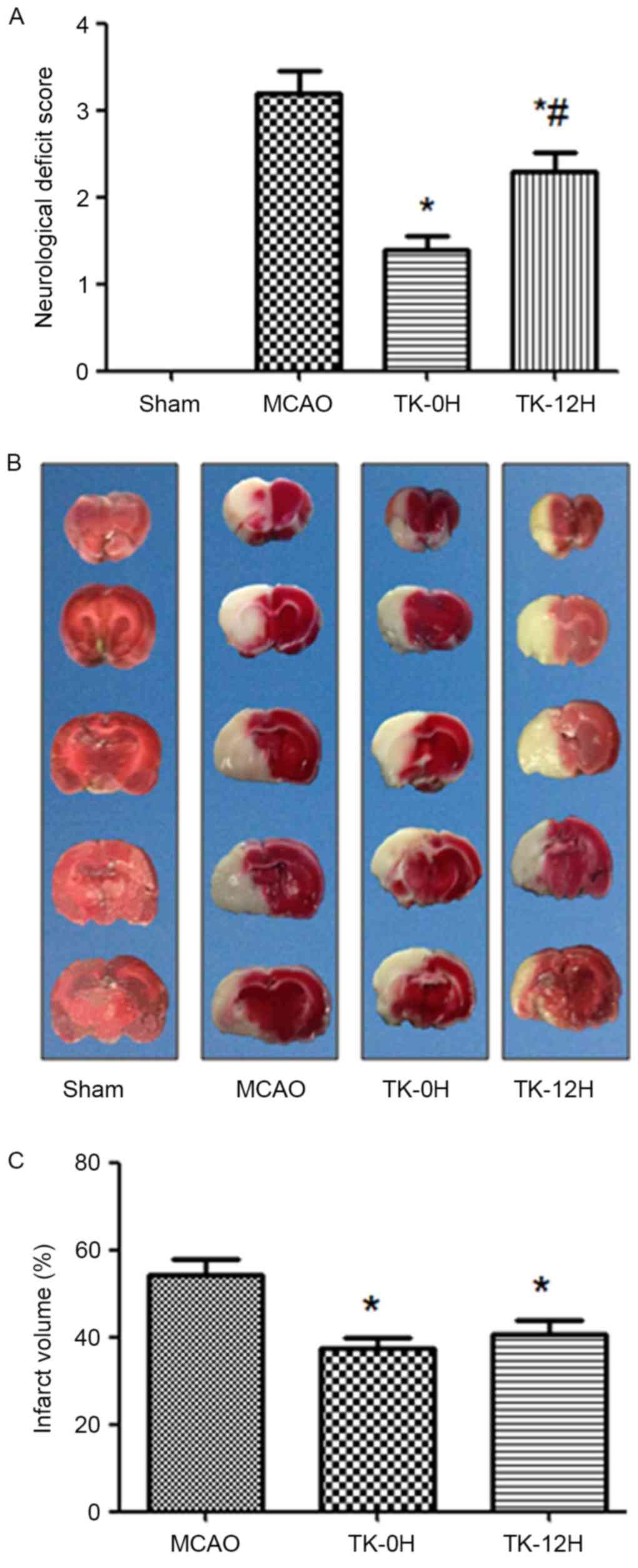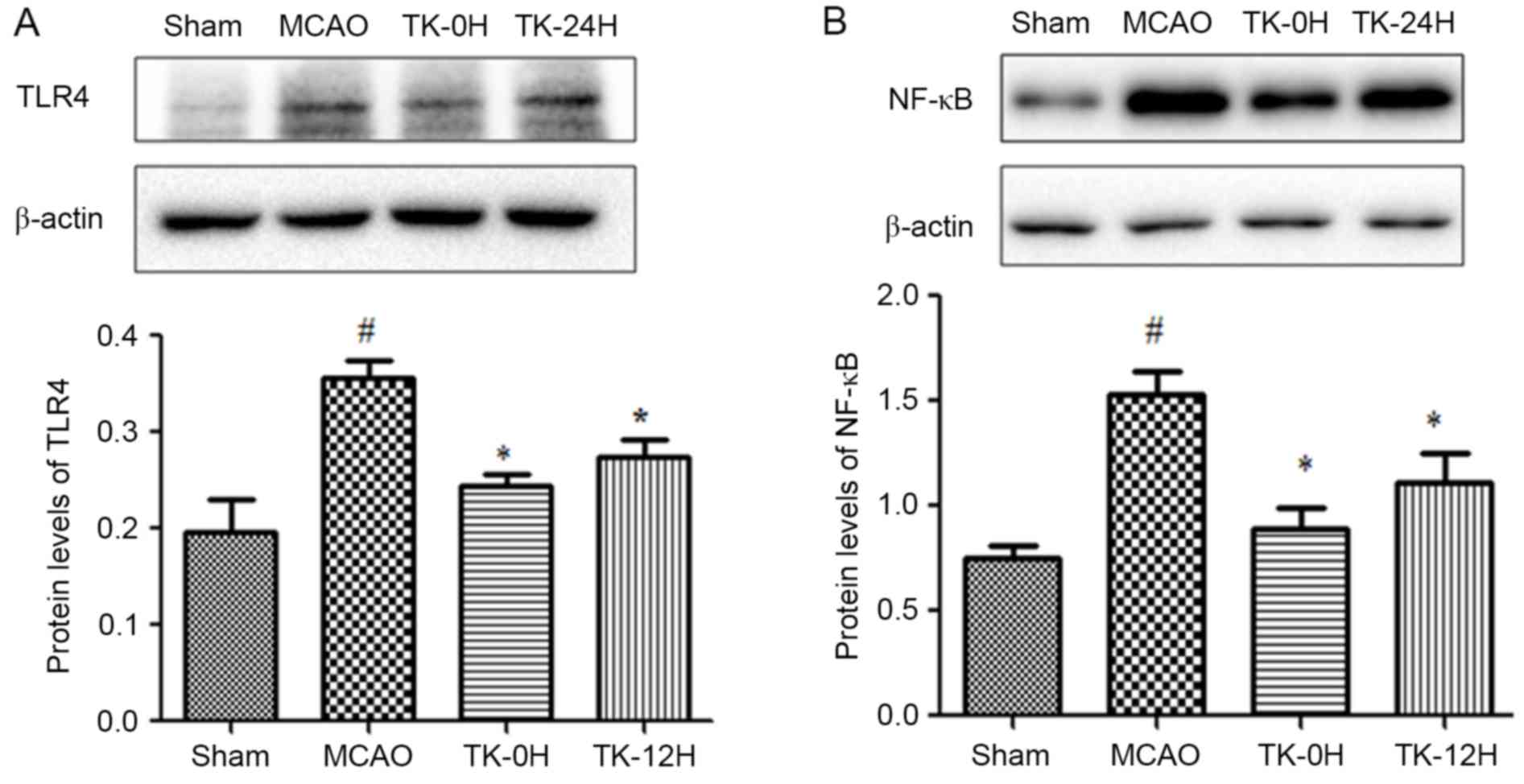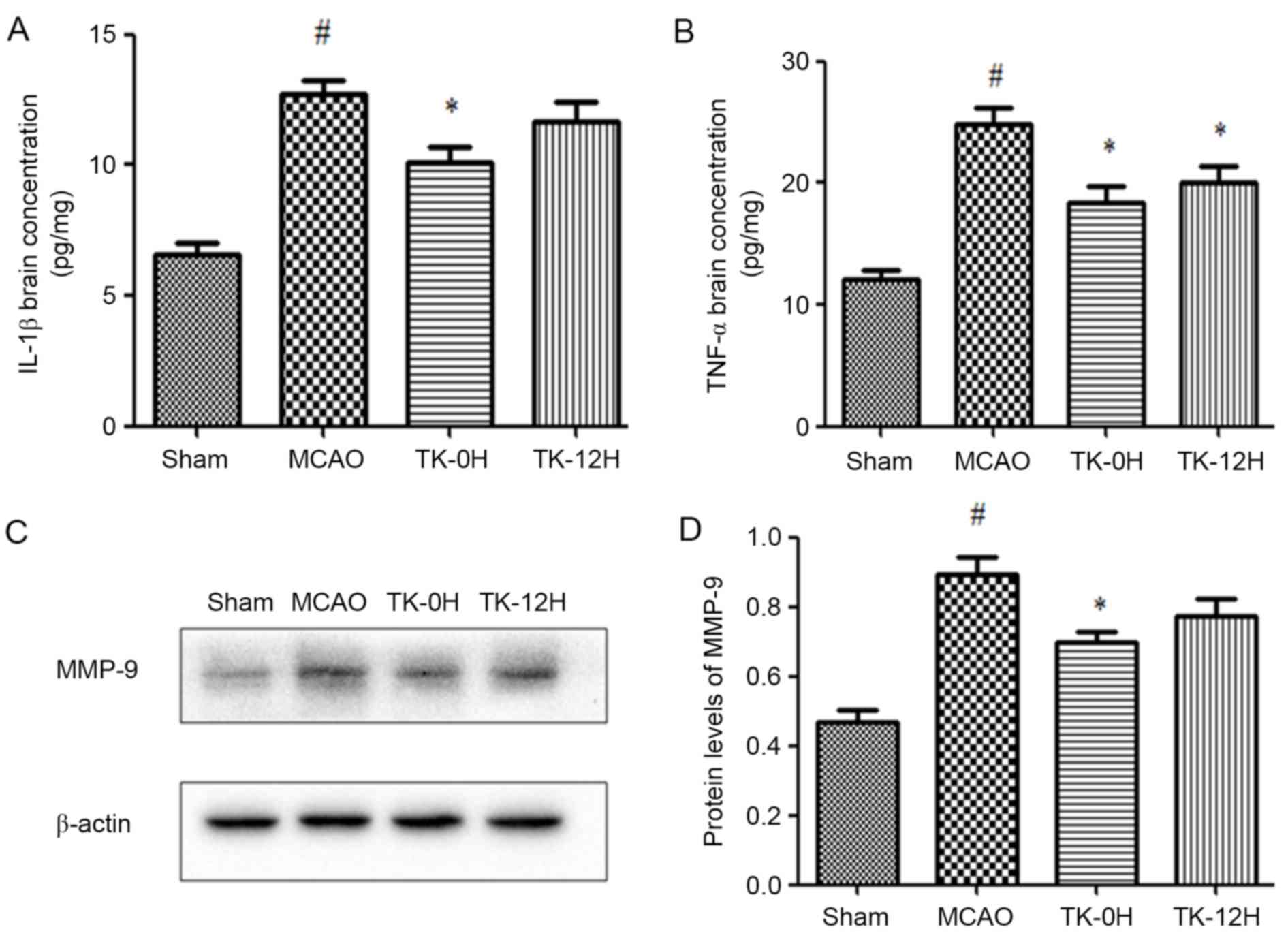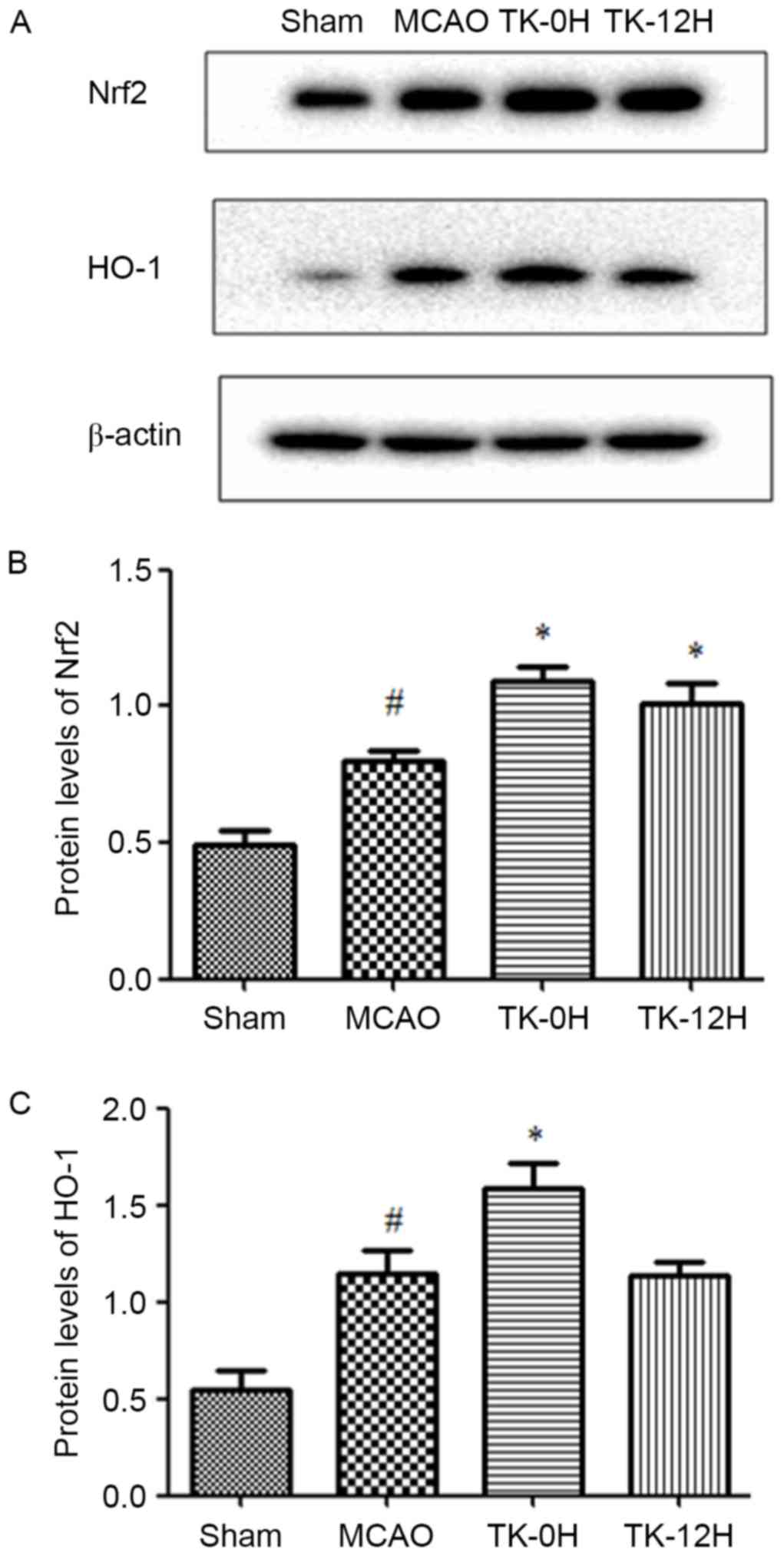|
1
|
Liu L, Wang D, Wong KS and Wang Y: Stroke
and stroke care in China: Huge burden, significant workload, and a
national priority. Stroke. 42:3651–3654. 2011. View Article : Google Scholar : PubMed/NCBI
|
|
2
|
Song D and Cho AH: Previous and recent
evidence of endovascular therapy in acute ischemic stroke.
Neurointervention. 10:51–59. 2015. View Article : Google Scholar : PubMed/NCBI
|
|
3
|
Amar AP, Griffin JH and Zlokovic BV:
Combined neurothrombectomy or thrombolysis with adjunctive delivery
of 3K3A-activated protein C in acute ischemic stroke. Front Cell
Neurosci. 9:3442015. View Article : Google Scholar : PubMed/NCBI
|
|
4
|
Reuter B, Grudzenski S, Chatzikonstantinou
E, Meairs S, Ebert A, Heiler P, Schad LR, Staufenbiel M, Hennerici
MG and Fatar M: Thrombolysis in experimental cerebral amyloid
angiopathy and the risk of secondary intracerebral hemorrhage.
Stroke. 45:2411–2416. 2014. View Article : Google Scholar : PubMed/NCBI
|
|
5
|
Chechneva OV, Mayrhofer F, Daugherty DJ,
Krishnamurty RG, Bannerman P, Pleasure DE and Deng W: A Smoothened
receptor agonist is neuroprotective and promotes regeneration after
ischemic brain injury. Cell Death Dis. 5:e14812014. View Article : Google Scholar : PubMed/NCBI
|
|
6
|
Chen X, Zhang X, Wang Y, Lei H, Su H, Zeng
J, Pei Z and Huang R: Inhibition of immunoproteasome reduces
infarction volume and attenuates inflammatory reaction in a rat
model of ischemic stroke. Cell Death Dis. 6:e16262015. View Article : Google Scholar : PubMed/NCBI
|
|
7
|
Ahmad M and Graham SH: Inflammation after
stroke: Mechanisms and therapeutic approaches. Transl Stroke Res.
1:74–84. 2010. View Article : Google Scholar : PubMed/NCBI
|
|
8
|
Nakajima H, Kubo T, Ihara H, Hikida T,
Danjo T, Nakatsuji M, Shahani N, Itakura M, Ono Y, Azuma YT, et al:
Nuclear-translocated Glyceraldehyde-3-phosphate dehydrogenase
promotes poly (ADP-ribose) polymerase-1 activation during
oxidative/nitrosative stress in stroke. J Biol Chem.
290:14493–14503. 2015. View Article : Google Scholar : PubMed/NCBI
|
|
9
|
Yainoy S, Houbloyfa P, Eiamphungporn W,
Isarankura-Na-Ayudhya C and Prachayasittikul V: Engineering of
chimeric catalase-Angiopep-2 for intracellular protection of brain
endothelial cells against oxidative stress. Int J Biol Macromol.
68:60–66. 2014. View Article : Google Scholar : PubMed/NCBI
|
|
10
|
Wang L, Li Z, Zhang X, Wang S, Zhu C, Miao
J, Chen L, Cui L and Qiao H: Protective effect of shikonin in
experimental ischemic stroke: Attenuated TLR4, p-p38MAPK, NF-κB,
TNF-α and MMP-9 expression, up-regulated claudin-5 expression,
ameliorated BBB permeability. Neurochem Res. 39:97–106. 2014.
View Article : Google Scholar : PubMed/NCBI
|
|
11
|
Candelario-Jalil E, Yang Y and Rosenberg
GA: Diverse roles of matrix metalloproteinases and tissue
inhibitors of metalloproteinases in neuroinflammation and cerebral
ischemia. Neuroscience. 158:983–994. 2009. View Article : Google Scholar : PubMed/NCBI
|
|
12
|
Vahedi K, Hofmeijer J, Juettler E, Vicaut
E, George B, Algra A, Amelink GJ, Schmiedeck P, Schwab S, Rothwell
PM, et al: Early decompressive surgery in malignant infarction of
the middle cerebral artery: A pooled analysis of three randomised
controlled trials. Lancet Neurol. 6:215–222. 2007. View Article : Google Scholar : PubMed/NCBI
|
|
13
|
Medzhitov R and Preston-Hurlburt P and
Janeway CA Jr: A human homologue of the Drosophila Toll protein
signals activation of adaptive immunity. Nature. 388:394–397. 1997.
View Article : Google Scholar : PubMed/NCBI
|
|
14
|
Jack CS, Arbour N, Manusow J, Montgrain V,
Blain M, McCrea E, Shapiro A and Antel JP: TLR signaling tailors
innate immune responses in human microglia and astrocytes. J
Immunol. 175:4320–4330. 2005. View Article : Google Scholar : PubMed/NCBI
|
|
15
|
Wang Y, Ge P and Zhu Y: TLR2 and TLR4 in
the brain injury caused by cerebral ischemia and reperfusion.
Mediators Inflamm. 2013:1246142013. View Article : Google Scholar : PubMed/NCBI
|
|
16
|
Zou N, Ao L, Cleveland JC Jr, Yang X, Su
X, Cai GY, Banerjee A, Fullerton DA and Meng X: Critical role of
extracellular heat shock cognate protein 70 in the myocardial
inflammatory response and cardiac dysfunction after global
ischemia-reperfusion. Am J Physiol Heart Circ Physiol.
294:H2805–H2813. 2008. View Article : Google Scholar : PubMed/NCBI
|
|
17
|
Hyakkoku K, Hamanaka J, Tsuruma K,
Shimazawa M, Tanaka H, Uematsu S, Akira S, Inagaki N, Nagai H and
Hara H: Toll-like receptor 4 (TLR4), but not TLR3 or TLR9,
knock-out mice have neuroprotective effects against focal cerebral
ischemia. Neuroscience. 171:258–267. 2010. View Article : Google Scholar : PubMed/NCBI
|
|
18
|
Caso JR, Pradillo JM, Hurtado O, Lorenzo
P, Moro MA and Lizasoain I: Toll-like receptor 4 is involved in
brain damage and inflammation after experimental stroke.
Circulation. 115:1599–1608. 2007. View Article : Google Scholar : PubMed/NCBI
|
|
19
|
Cao CX, Yang QW, Lv FL, Cui J, Fu HB and
Wang JZ: Reduced cerebral ischemia-reperfusion injury in Toll-like
receptor 4 deficient mice. Biochem Biophys Res Commun. 353:509–514.
2007. View Article : Google Scholar : PubMed/NCBI
|
|
20
|
Rao J, Qian X, Li G, Pan X, Zhang C, Zhang
F, Zhai Y, Wang X and Lu L: ATF3-mediated NRF2/HO-1 signaling
regulates TLR4 innate immune responses in mouse liver
ischemia/reperfusion injury. Am J Transplant. 15:76–87. 2015.
View Article : Google Scholar : PubMed/NCBI
|
|
21
|
Surh YJ and Na HK: NF-kappaB and Nrf2 as
prime molecular targets for chemoprevention and cytoprotection with
anti-inflammatory and antioxidant phytochemicals. Genes Nutr.
2:313–317. 2008. View Article : Google Scholar : PubMed/NCBI
|
|
22
|
Shah ZA, Li RC, Ahmad AS, Kensler TW,
Yamamoto M, Biswal S and Doré S: The flavanol (−)-epicatechin
prevents stroke damage through the Nrf2/HO1 pathway. J Cereb Blood
Flow Metab. 30:1951–1961. 2010. View Article : Google Scholar : PubMed/NCBI
|
|
23
|
Albert-Weißenberger C, Sirén AL and
Kleinschnitz C: Ischemic stroke and traumatic brain injury: The
role of the kallikrein-kinin system. Prog Neurobiol 101–102. 1–82.
2013.
|
|
24
|
Xia CF, Yin H, Yao YY, Borlongan CV, Chao
L and Chao J: Kallikrein protects against ischemic stroke by
inhibiting apoptosis and inflammation and promoting angiogenesis
and neurogenesis. Hum Gene Ther. 17:206–219. 2006. View Article : Google Scholar : PubMed/NCBI
|
|
25
|
Xia CF, Yin H, Borlongan CV, Chao L and
Chao J: Kallikrein gene transfer protects against ischemic stroke
by promoting glial cell migration and inhibiting apoptosis.
Hypertension. 43:452–459. 2004. View Article : Google Scholar : PubMed/NCBI
|
|
26
|
Longa EZ, Weinstein PR, Carlson S and
Cummins R: Reversible middle cerebral artery occlusion without
craniectomy in rats. Stroke. 20:84–91. 1989. View Article : Google Scholar : PubMed/NCBI
|
|
27
|
Tatlisumak T, Carano RA, Takano K,
Opgenorth TJ, Sotak CH and Fisher M: A novel endothelin antagonist,
A-127722, attenuates ischemic lesion size in rats with temporary
middle cerebral artery occlusion: A diffusion and perfusion MRI
study. Stroke. 29:850–858. 1998. View Article : Google Scholar : PubMed/NCBI
|
|
28
|
Arumugam TV, Tang SC, Lathia JD, Cheng A,
Mughal MR, Chigurupati S, Magnus T, Chan SL, Jo DG, Ouyang X, et
al: Intravenous immunoglobulin (IVIG) protects the brain against
experimental stroke by preventing complement-mediated neuronal cell
death. Proc Natl Acad Sci USA. 104:pp. 14104–14109. 2007;
View Article : Google Scholar : PubMed/NCBI
|
|
29
|
Hua F, Ma J, Ha T, Xia Y, Kelley J,
Williams DL, Kao RL, Browder IW, Schweitzer JB, Kalbfleisch JH and
Li C: Activation of Toll-like receptor 4 signaling contributes to
hippocampal neuronal death following global cerebral
ischemia/reperfusion. J Neuroimmunol. 190:101–111. 2007. View Article : Google Scholar : PubMed/NCBI
|
|
30
|
Tang SC, Arumugam TV, Xu X, Cheng A,
Mughal MR, Jo DG, Lathia JD, Siler DA, Chigurupati S, Ouyang X, et
al: Pivotal role for neuronal Toll-like receptors in ischemic brain
injury and functional deficits. Proc Natl Acad Sci USA. 104:pp.
13798–13803. 2007; View Article : Google Scholar : PubMed/NCBI
|
|
31
|
Ridder DA and Schwaninger M: NF-kappaB
signaling in cerebral ischemia. Neuroscience. 158:995–1006. 2009.
View Article : Google Scholar : PubMed/NCBI
|
|
32
|
Hayden MS, West AP and Ghosh S: NF-kappaB
and the immune response. Oncogene. 25:6758–6780. 2006. View Article : Google Scholar : PubMed/NCBI
|
|
33
|
Schneider A, Martin-Villalba A, Weih F,
Vogel J, Wirth T and Schwaninger M: NF-kappaB is activated and
promotes cell death in focal cerebral ischemia. Nat Med. 5:554–559.
1999. View Article : Google Scholar : PubMed/NCBI
|
|
34
|
Morita-Fujimura Y, Fujimura M, Yoshimoto T
and Chan PH: Superoxide during reperfusion contributes to caspase-8
expression and apoptosis after transient focal stroke. Stroke.
32:2356–2361. 2001. View Article : Google Scholar : PubMed/NCBI
|
|
35
|
Shih AY, Li P and Murphy TH: A
small-molecule-inducible Nrf2-mediated antioxidant response
provides effective prophylaxis against cerebral ischemia in vivo. J
Neurosci. 25:10321–10335. 2005. View Article : Google Scholar : PubMed/NCBI
|
|
36
|
Poss KD and Tonegawa S: Reduced stress
defense in heme oxygenase 1-deficient cells. Proc Natl Acad Sci
USA. 94:pp. 10925–10930. 1997; View Article : Google Scholar : PubMed/NCBI
|
|
37
|
Satoh T, Izumi M, Inukai Y, Tsutsumi Y,
Nakayama N, Kosaka K, Shimojo Y, Kitajima C, Itoh K, Yokoi T and
Shirasawa T: Carnosic acid protects neuronal HT22 cells through
activation of the antioxidant-responsive element in free carboxylic
acid- and catechol hydroxyl moieties-dependent manners. Neurosci
Lett. 434:260–265. 2008. View Article : Google Scholar : PubMed/NCBI
|
|
38
|
Shi H, Jing X, Wei X, Perez RG, Ren M,
Zhang X and Lou H: S-allyl cysteine activates the Nrf2-dependent
antioxidant response and protects neurons against ischemic injury
in vitro and in vivo. J Neurochem. 133:298–308. 2015. View Article : Google Scholar : PubMed/NCBI
|
|
39
|
Li L, Zhang X, Cui L, Wang L, Liu H, Ji H
and Du Y: Ursolic acid promotes the neuroprotection by activating
Nrf2 pathway after cerebral ischemia in mice. Brain Res.
1497:32–39. 2013. View Article : Google Scholar : PubMed/NCBI
|
|
40
|
Kunze R, Urrutia A, Hoffmann A, Liu H,
Helluy X, Pham M, Reischl S, Korff T and Marti HH: Dimethyl
fumarate attenuates cerebral edema formation by protecting the
blood-brain barrier integrity. Exp Neurol. 266:99–111. 2015.
View Article : Google Scholar : PubMed/NCBI
|
|
41
|
Sapojnikova N, Kartvelishvili T, Asatiani
N, Zinkevich V, Kalandadze I, Gugutsidze D, Shakarishvili R and
Tsiskaridze A: Correlation between MMP-9 and extracellular cytokine
HMGB1 in prediction of human ischemic stroke outcome. Biochim
Biophys Acta. 1842:1379–1384. 2014. View Article : Google Scholar : PubMed/NCBI
|
|
42
|
Clark AW, Krekoski CA, Bou SS, Chapman KR
and Edwards DR: Increased gelatinase A (MMP-2) and gelatinase B
(MMP-9) activities in human brain after focal ischemia. Neurosci
Lett. 238:53–56. 1997. View Article : Google Scholar : PubMed/NCBI
|
|
43
|
Cai Y, Liu X, Chen W, Wang Z, Xu G, Zeng Y
and Ma Y: TGF-β1 prevents blood-brain barrier damage and
hemorrhagic transformation after thrombolysis in rats. Exp Neurol.
266:120–126. 2015. View Article : Google Scholar : PubMed/NCBI
|
|
44
|
Kamiya T, Katayama Y, Kashiwagi F and
Terashi A: The role of bradykinin in mediating ischemic brain edema
in rats. Stroke. 24:571–576. 1993. View Article : Google Scholar : PubMed/NCBI
|
|
45
|
Zausinger S, Lumenta DB, Pruneau D,
Schmid-Elsaesser R, Plesnila N and Baethmann A: Effects of LF
16–0687 Ms, a bradykinin B(2) receptor antagonist, on brain edema
formation and tissue damage in a rat model of temporary focal
cerebral ischemia. Brain Res. 950:268–278. 2002. View Article : Google Scholar : PubMed/NCBI
|
|
46
|
Lu RY, Luo DF, Xiao SH, Yang LH, Zhao J,
Ji EN, Tao EX, Xing YG, Zhu FY, Luan P and Liu J: Kallikrein gene
transfer induces angiogenesis and further improves regional
cerebral blood flow in the early period after cerebral
ischemia/reperfusion in rats. CNS Neurosci Ther. 18:395–399. 2012.
View Article : Google Scholar : PubMed/NCBI
|
|
47
|
Chen ZB, Huang DQ, Niu FN, Zhang X, Li EG
and Xu Y: Human urinary kallidinogenase suppresses cerebral
inflammation in experimental stroke and downregulates nuclear
factor-kappaB. J Cereb Blood Flow Metab. 30:1356–1365. 2010.
View Article : Google Scholar : PubMed/NCBI
|
|
48
|
Chao J, Shen B, Gao L, Xia CF, Bledsoe G
and Chao L: Tissue kallikrein in cardiovascular, cerebrovascular
and renal diseases and skin wound healing. Biol Chem. 391:345–355.
2010. View Article : Google Scholar : PubMed/NCBI
|


















